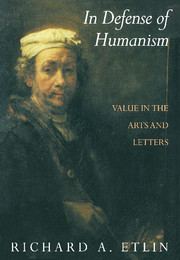Postscript: The Parameters of Culture
Published online by Cambridge University Press: 05 June 2012
Summary
After having explored first the nature of aesthetic experience and the ways in which value can be found in art and then the errors in thinking that have been opposed to humanist concepts of value and truth, I now close this inquiry with a brief consideration of the parameters of culture. No matter how helpful are the distinctions between the sociology and the aesthetics of art and no matter how enlightening is an awareness of the logical faults or intellectual sleights of hand by poststructuralists, we still lack a global orientation to help guide our thoughts in a direction other than those offered by poststructuralism. Thus, the need for an outline of the parameters of culture. To this end I wish to present two analogies, one based on the story of the Tower of Babel and the other on the nature of that deceptively ordinary object, the music box.
The Tower of Babel
Poststructuralism sees the world according to two opposing versions of the story of the Tower of Babel. On the one hand, it argues for the universal application of its method to all forms of discourse, not only the various genres within the arts – painting, sculpture, literature, and so forth, – and of the subgenres within each art form – lyrical poetry, narrative poetry, the short story, the novel, for example, for literature – but also to all disciplines – literature, law, anthropology, and so forth.
- Type
- Chapter
- Information
- In Defense of HumanismValue in the Arts and Letters, pp. 147 - 154Publisher: Cambridge University PressPrint publication year: 1996



